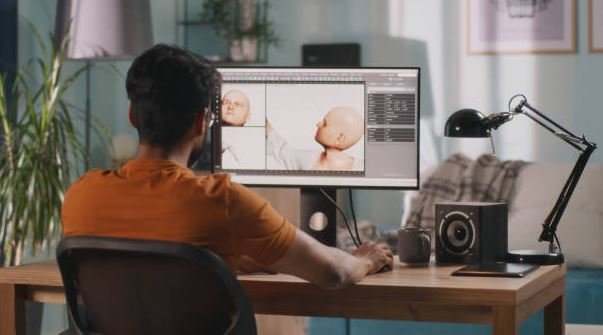Last week, as I do most Mondays, I was browsing a subreddit in design. I kept coming across an interesting thread where a user asked whether having a degree in animation was necessary to become an animator.
These questions didn’t just come out of nowhere. A Redditor explained that he had graduated with a Bachelor’s degree in political science and worked as an animator for five years. Despite his work experience, he wanted to know if having a degree would have gotten him somewhere faster.
Due to the high demand for good animators in the animation industry, many people wonder if a professional art degree is significant, or can you be an animator without college?
No, you don’t need a degree to be an animator. College education or certification has almost no significance in animation or illustration. One essential skill required by filmmakers is that animators must have a strong sense of creativity and imagination to be able to come up with unique storylines and animation techniques. They also need to be able to communicate well with other members of their team so they can effectively collaborate on projects.
Most of the most recognized animators in the United States attended schools like USC, CalArts, and NYU’s Tisch School of the Arts. A lot of them didn’t have a degree in animation. You can also learn animation by yourself using books or online resources. The best thing about energy is that it’s not limited by time and money. Most people value experience over certification in this field.
So, what’s the need for school? Well, for starters, art basics are essential when it comes to creating character development, storyboards, and pre-production artwork. While a degree is not necessary to become an animator, it can help you gain valuable skills that will benefit your career.
Students who pursue degrees in animation typically learn about the field’s history and how it has evolved. They also study how technology has changed energy over time and how digital tools have changed how animators work today compared to earlier generations of artists.
Am I Doomed If I Don’t Go To A Top Animation College?
The short answer is no. Once you’re working in animation, nobody cares where you went to school or your major; they care about your work ethic and talent!
If you’re not looking to become an animator but still want to work with animation, you can start by volunteering with an animation studio or look for part-time jobs that have flexible hours and pay well.
What is the Average Animator Salary?

Can I Get My Bachelor’s Degree in Animation Online?
Whether you’re thinking about a career in animation or are simply interested in exploring the possibilities, you may wonder if a degree program is right for you. The good news is that it’s possible to earn your bachelor’s degree in animation online, whether you’re a working professional or looking to make a career change.
What Is the Job Outlook for Animators?
The field of animation is changing very rapidly, and there are many new opportunities for those who can keep up. The main jobs available to animators are creating animated feature films, online games, and short films for the web.
There is also an increasing demand for animators specializing in specific areas such as computer animation, virtual reality, stop-motion animation, and even special effects. The fact is that as long as there are people with creative minds, there will be a need for animators to bring their ideas to life through motion pictures.
Is Animation A Promising Career?
Animation is a good career choice as it offers the opportunity to be in an artistic field, work with computers and meet exciting people. It also provides a variety of career paths and allows you to work from home or on location.
Animators do not need a degree to call themselves, but there is nothing wrong with wanting an education. If you want to become an animator without a degree, you must understand that you can do it, but it will take effort and hard work. You’ll need to enjoy the craft of animation just as much as you enjoy being creative. The final product will be a product of your passion for animation.
What Do Animators Do?
Animators are responsible for bringing characters to life in movies, television shows, and computer games. They create these characters’ movements using various tools, including computers and hand-drawn illustrations.
An animator’s job can be divided into two main categories: character animation and special effects animation.
Character animation involves animating human characters or animals as part of a story or narrative. Special effects animation is used for anything that isn’t a character but still needs to move according to the rules of physics (for example, smoke).
The work of an animator is highly varied, but there are some everyday tasks that all animators perform in their day-to-day jobs:
- Drawing: Animators draw all their characters by hand to plan how they will move and interact with the world around them. This can be done on paper or digitally using an illustration program like Photoshop or Illustrator.
- Planning: Once an animator has drawn their character design, they’ll often plan out how they want it to move before starting on any actual animation work. This involves creating rough sketches that show how they would like the character to move from one pose to another.
- Character Designs: In many cases, animators are required to design characters before they animate them. A character designer will use sketching techniques or computer programs to create drawings of a character’s appearance and movement style.
- Developing Storyboards: Before starting any animation projects, animators develop visual storyboards that outline how each scene will be shot and edited into a cohesive whole. This process involves creating sketches showing how each stage will progress and a detailed timeline.
- Planning Camera Angles: Animators need to decide how much information they want their audience to see at once and how best to direct their attention within each animation frame so they can achieve both artistic expression and clarity in each scene they create.
What Degree Do You Need To Be an Animator?
A degree in animation is not as significant in making a living in the field. The question of whether or not you need a degree to work as an animator is often asked.
There are many career paths that you can take to become an animator. Some people get Bachelor of Fine Arts or Bachelor of Science degrees. However, there is no degree you need to become an animator. All you need is hard work, dedication, and knowledge of what it takes to animate.
If you decide that a degree would help your career as an animator, there are so many different degrees that you could choose: a degree in computer science, physics, art history, graphic design, etc. The important part is that your classes will give you the knowledge and training needed to be successful in this field.
Even the most talented people need to know how to make their ideas come alive on film so they can animate them. You’ll learn about storyboarding and animating characters with key poses and expressions for each scene, which creates a fluid movement throughout the film. You’ll also learn about background design and building sets for the characters to interact with during the stages.
The basics of computer graphics know-how are essential because most animations are made with software such as Adobe Flash, Maya, or 3DS Max. Many schools offer degrees that focus on producing animations using different programs. Still, you can also find several online schools that teach the same skills without requiring students to be physically present.
Can I Be An Animator Without A Degree?

Animation is one of those jobs that can be learned from home through online courses and tutorials. You can also take a few classes at a local college or university if you have the time and money.
Animators create the characters, scenes, and objects that bring life to your project. They can work in various fields, from video games to television commercials.
In some cases, animators are self-employed freelancers who will work on projects for several different companies. In other instances, animators might work for a large animation studio or publisher that develops its products. Here are some reasons you don’t need a degree to be an animator.
1. A degree doesn’t guarantee that you’ll learn how to draw exceptionally well. It only ensures you can remove technically well enough to pass some tests. If you don’t have the natural drawing ability, it will not help you improve.
2. You can learn to draw exceptionally well without formal education.
3. There are so many different animation styles out there, and most studios specialize in only one or two types, so it’s better if you can specialize in them. At best, a degree will teach you only one specific style of animation, which is less valuable for someone who wants to work in the industry in general.
4. Many studios don’t require experience when they hire new animators because they can train anyone with good technical skills and potential. If you get engaged with only a portfolio showing your natural ability, they will pay for you to take classes at their expense.
5. Even as a beginner, there are a lot of job boards where you can find work without any prior experience.
6. Unlike other fields like medicine and law, there is no need to have a college degree to become an animator. This means that you can work on your skills by taking online courses or enrolling in an animation school while working as an animator at the same time.
How Long Does a Bachelor’s Degree in Animation Take?
So, you’ve seen all of the great animated films that feature work by animators and have decided that you want to join in on the fun. But how long is it going to take you to get there?
A bachelor’s degree in animation can take 2 to 4 years, depending on the program. Most bachelor’s degree programs in animation are integrated into more prominent colleges and universities, requiring a certain number of general education courses and animation-specific courses.
The program will also include a student internship or practicum that allows students to gain hands-on experience with the work they’ve been learning in their classes.
The length of an animation degree depends heavily on the student’s level of commitment and how many credits they are willing to take at once.
The first example would be Walt Disney, who dropped out of high school at 16 and became one of the most successful animators. Some are self-taught, while others have degrees in computer science or graphic design. The best animators can bring stories and characters to life through animation. Ralph Bakshi, Mark Henn, Eiichiro Oda, and Don Bluth are all excellent animators that were successful without any degree in the field.
How to Become an Animator (Without a Degree)
Many programs are available that teach you how to animate using various techniques. Some are offered by colleges and universities, while others are provided by private companies or individuals who have been successful in the field.
The good news is that many of these skills can be taught at home, either by yourself or with friends who are also interested in animation. And the great information is that once you’ve learned how to animate, there are plenty of ways to use those skills to get paid or earn a living.
If you’re interested in becoming an animator without a degree, here are some tips for getting started:
Start by learning about the equipment used by animators and how it works. This will help you understand how each element works together and what tools are available for creating animations on your computer.
Next, consider taking some classes or workshops on Flash or other software programs that allow you to create animations easily and quickly. These classes can be found online or in person at local community centers or libraries throughout the country.
Spend time looking through videos on YouTube or other sites that show different types of animations being created from start to finish so that you can get ideas about how these types of programs work and their growth potential.






![How To Create Clickbait Headlines That Works [With Examples]](https://incomery.com/wp-content/uploads/2024/02/How-To-Create-Clickbait-Headlines-That-Works-With-Examples.jpg)
![How To Get Funding For An Online Startup [10 Easy Ways]](https://incomery.com/wp-content/uploads/2024/02/How-To-Get-Funding-For-An-Online-Startup-10-Easy.jpg)
